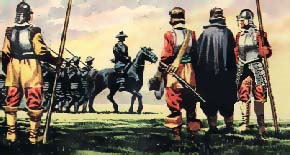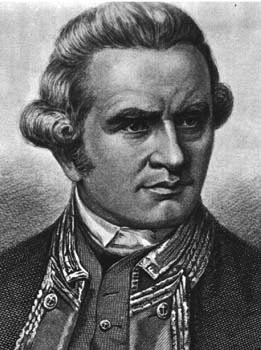
October 27


0097 To placate the Praetorians of Germany, Nerva of Rome adopts Trajan, the Spanish-born governor of lower Germany.

1492 Christopher Columbus discovers Cuba and claims the island for Spain.
1505 Death: Ivan III, Tsar of Russia. Known as Ivan the Great, he became tsar in 1462, strengthened the authority of the monarchy and laid the foundations for a centralized state.

1612 A Polish army that had invaded Russia capitulates to Prince Dimitri Pojarski and his Cossacks.

1659 William Robinson and Marmaduke Stevenson become the first Quakers to be executed in America.
1662 Charles II of England sells Dunkirk to France for 2.5 million livres.


1787 The first of the 85 Federalist Papers is published in a New York City newspaper.
1795 Pinckney's Treaty between Spain and the United States is signed. It establishes the former southern boundary of the United States at the 31st parallel and gives Americans the right to send goods down the Mississippi without paying duty to Spain.

1807 The Treaty of Fontainebleau is signed by Napoleon and Charles IV of Spain which provides for the division of Portugal into three parts.

1844 Birth: Klas Arnoldson, in Sweden, politician, pacifist (Nobel 1908).
1858 Birth: Theodore Roosevelt, 26th president of the USA.




1873 Farmer Joseph F. Glidden applies for a patent on barbed wire. Glidden will eventually receive five patents and is generally considered the inventor of barbed wire.

1896 The first Pali Road is completed in Hawaii.
1901 The first known use of a 'getaway car' occurs in Paris when three thieves drive off after holding up a jewelry shop.
1904 The first subway cars are placed in operation, forming the IRT (Interborough Rapid Transit), of the New York City subway system. The cars operate between the Brooklyn Bridge and Broadway; from City Hall to W. 145th Street. This is the first underwater, underground rail system in the world. The subway/bus fare is set at one nickel.

1917 WW1: The first American soldier fires a shot in World War I. (Schlesinger I)
1917 20,000 women march in a suffrage parade in New York. As the largest state and the first on the East Coast to do so, New York has an important effect on the movement to grant all women the vote in all elections.
1918 WW1: German Kaiser Wilhelm II accepts the resignation of General Erich Ludendorff after the failure of his offensive on the Western Front.



1926 Birth: H. R. Haldeman, former White House Chief of Staff-Watergate figure.
1933 The French government cancels orders issued by local municipal authorities to expel German Jewish refugees.
1934 An assassination plot against Mussolini is exposed in Italy.
1935 An anti-Nazi rally in Hyde Park, London, draws 18,000 people.
1937 Jewish access to public bathhouses in Danzig is limited to specified hours, one day a week.
1939 Diary of Leon Gladun: Today we received a real feast--for the first time I'm satiated. Everyone is still talking that we'll be leaving for sure--but it seems never to arrive. Perhaps we're finally going as there's to be a quarantine in Szepetowka.
1940 Holocaust: 290 Jews, old people, cripples and the mentally ill from the Old Peoples Home in Kalisz, Poland, are put in a truck, taken just outside of town to the woods at Winiary, and gassed inside the truck with exhaust fumes. All 290 are buried in the woods. (Atlas)
1941 In a broadcast to the nation on Navy Day, President Franklin D. Roosevelt declares, 'America has been attacked, the shooting has started'. He does not ask for full-scale war, realizing that many Americans are not yet ready for such a step.

1941 Church and Reich: Bishop Berning reports to Cardinal Bertram that the Gestapo has refused their request for permission to allow Jewish Catholics to wear the Star of David while in Church. (Lewy)
1941 Church and Reich: The Bishop of Limberg informs Bishop Wienken, the episcopate's troubleshooter in Berlin, that the transport of Jews from Frankfurt earlier in the month had included Catholic "non-Aryans" to whom no preferred treatment had been granted. Their fate was especially sad, he said, because they were regarded by the other Jews as apostates (turncoats).

1942 WW2: An indecisive two-day air and sea battle around the Solomon Islands ends with severe damage to both US and Japanese fleets.
1944 Church and Reich: Bormann writes back to Rosenberg informing him that Hitler has rejected the idea of using clergymen for forced labor. (Lewy)
1948 Israel recaptures Nizzanim in the Negev.
1961 Outer Mongolia and Mauritania become the 102nd and 103rd members of the UN.


1966 The UN General Assembly votes to end South Africa's mandate over South West Africa.
1969 St Vincent and the Grenadines gain associated status with Britain.

1971 The government of Congo announces that the country would change its name to the Republic of Zaire.
1975 Egyptian President Anwar Sadat, on his first trip to the US, arrives in Washington for talks with President Ford.
1978 President Carter signs the Hawkins-Humphrey full employment bill.
1978 Menachem Begin of Israel and Anwar Sadat of Egypt are named winners of the 1978 Nobel Peace Prize.
1979 St Vincent and the Grenadines become independent of the UK.
1979 The Voluntary Euthanasia Society publishes a how-to-do-it suicide guide.
1981 Andrew Young, a former UN Ambassador, is elected mayor of Atlanta, Georgia.
1982 China announces its population has reached over 1 billion.
1987 South Korean voters overwhelmingly approve a new constitution. The referendum approves constitutional reforms, including direct elections to the presidency.

1988 Larry Flynt pays a hitman $1 million to kill Hefner, Guccione and Sinatra.

1993 Police investigating complaints of persistent barking by a dog in Heerlen, Holland, discover the noise coming from a tape recording intended to scare off burglars.
1994 President Clinton ends a visit to Syria, the first by a US leader in 20 years, reporting substantive progress in his efforts to restart Syrian-Israeli peace talks.
1994 The US Justice Department announces that the US prison population has exceeded one million for the first time.

1995 A court in Milan sentences two former Italian prime ministers, Bettino Craxi and Arnaldo Forlani to jail terms on corruption charges.

2001 Between 5,000 and 10,000 Pakistani warriors join a convoy of trucks and busses heading to the northern Afghanistan frontier. The Pakistani "jihad brigade" vows to fight a holy war against United States.
2001 American warplanes strike Taliban targets with increased ferocity. Civilian deaths in Afghanistan continue to mount, with the errant bombing of a village north of Kabul killing ten.
2001 Israeli troops delay withdrawal from Palestinian areas citing ongoing battles with gunmen.
2001

2002

2003

2004

2004

Visit:




 Visit:
Visit:

Click Here to email the History: One Day At a Time webmaster.